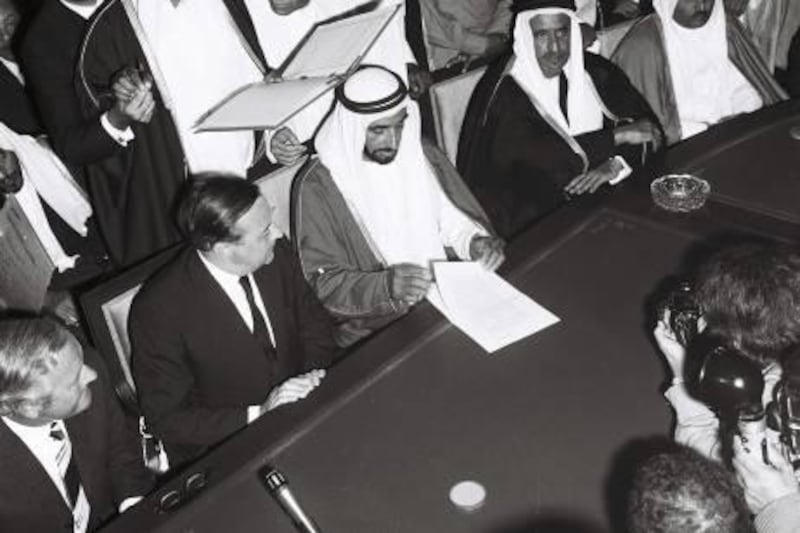In a crowded room in Union House, with photographers and journalists clambering onto the table when there was no more room to stand, there was a palpable sense of excitement. As the leaders of the emirates gathered in Sheikh Rashid's majlis in Dubai exactly 46 years ago to sign a Treaty of Friendship, the atmosphere whipped into fever pitch – one of "jubilation and chaos", recalled British political agent Julian Walker, who was in the room that day. The moment was a marker in history, signposting the foundation of the United Arab Emirates and one which is celebrated today with just as much infectious fervour, excitement and vigour as it was on December 2, 1971.
For National Day in the UAE is not simply about the flags, the fireworks and the festivities, although all those things count. It is also not just about the captivating lights strung along the corniches of every emirate and homes and institutions festooned in the red, white, black and green. It is about celebrating the founding principles of tolerance, open-mindedness towards other cultures and a pride in heritage, which is instilled in every Emirati and resident today. The 1971 treaty was signed in “a spirit of close friendship’ and that generosity has been extended to the 200 nationalities who now live in the UAE.
As businesswoman Shaikha Al Maskari says, National Day is a time to reflect and marvel at the great strides the UAE has made since 1971. In a few decades, the country has been transformed from a network of fishing villages into a dynamic international trading and financial hub. Its eyecatching, landmark buildings are talked about the world over, from Louvre Abu Dhabi to Burj Khalifa. It has a diverse economy which doesn't simply rely on wealth from its plentiful oil reserves but banks instead on a knowledge economy and tourism, with equal opportunities in education and the workplace. Every decade has seen staggering growth and an evolution in the vision and creativity of its leaders, which started even before the country's formation with its late Founding Father, Sheikh Zayed. Even before cities began appearing in the vast desert, he saw the potential of what his country could achieve when he uttered the words: "Any ruler is only there to serve his people and secure for them prosperity and progress."
Those are the two pillars holding his dream aloft. They are realised in the very fabric of society and the awe-inspiring landscape of the UAE. For the country’s ambitions don’t simply stop with the building blocks of wealth and good fortune. They are far-reaching, longsighted and go beyond the realms of the imaginable. Just as Sheikh Zayed cannot possibly have envisaged just how far the UAE might have come less than 50 years after he became its first president, so the UAE Centennial 2071 strategy to make the country “the best in the world” is about projecting as far as possible into the future.
Next year will be the Year of Zayed. It will be marked with a series of events across the country, entrenched in the values the Founding Father held dear, from wisdom, determination and respect to loyalty and a willingness to make sacrifices. In difficult times across the region, those are the values which continue to keep the nation on a steady course.





